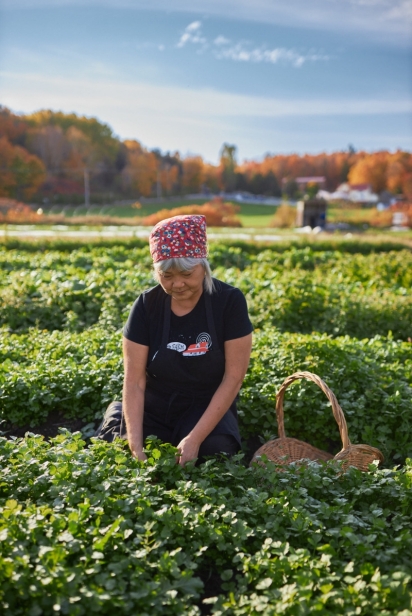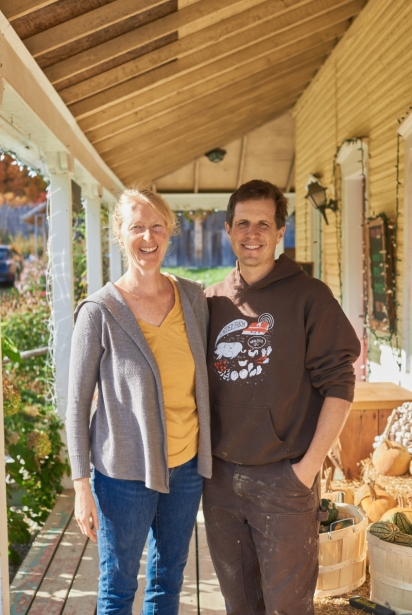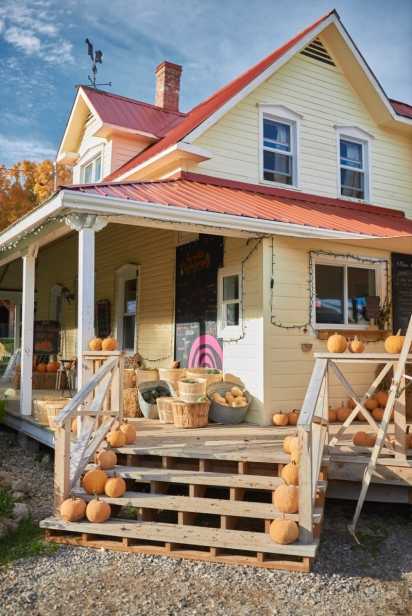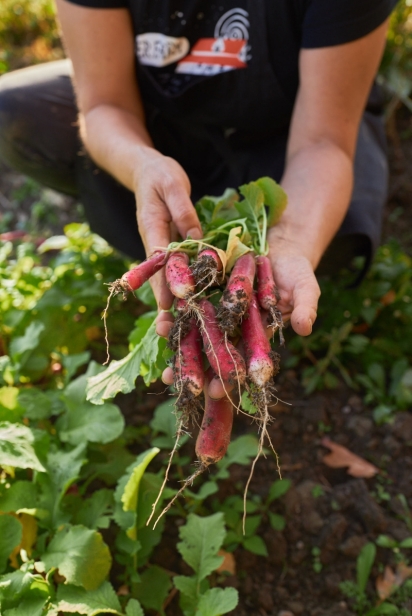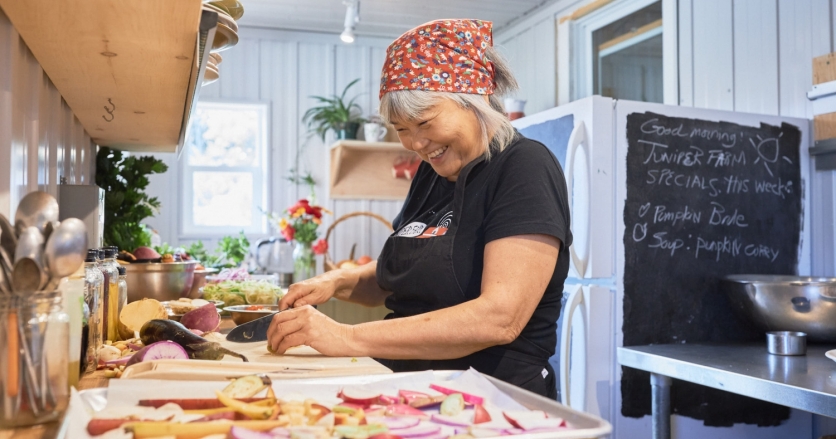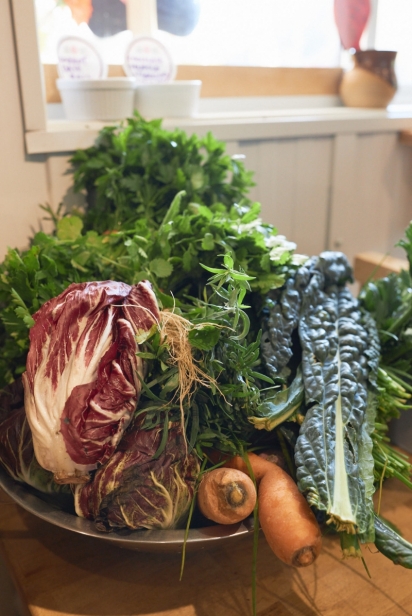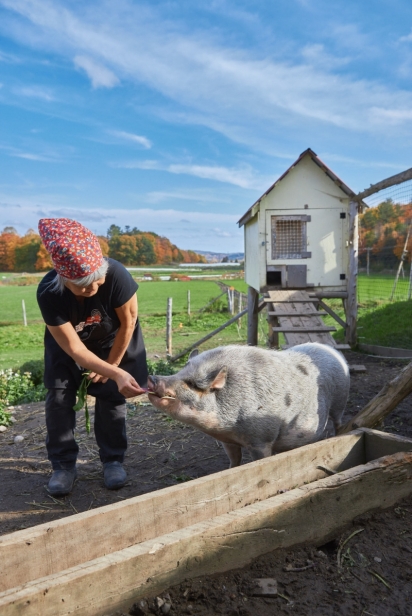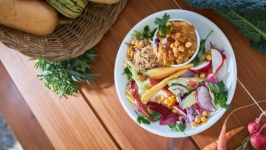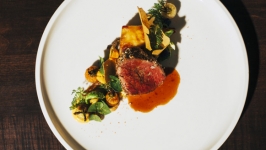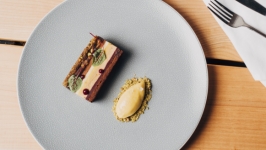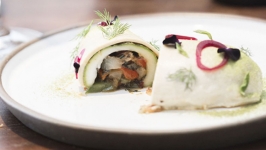'I Care About Food and Connection'
As Caroline Ishii wanders through the rows of fresh vegetables at Juniper Farm, her voice undulating with excitement at the prospect of shiny, delicate cilantro, hearty deep green kale as high as her hips and shiso leaves as pretty as they are tasty, it becomes clear the “Accidental Chef” may have finally landed where she was meant to be.
Speaking with Juniper Turgeon and Alex Mackay-Smith, the owners of this peaceful Wakefield farm oasis surrounded by trees sporting their most vibrant oranges, yellows and reds, it’s obvious they feel the same way.
Ishii is now at the helm of Juniper Farm’s culinary program, which includes a take-out window featuring a farm-fresh menu of giant salads and sandwiches and sometimes, “Ishii stone bowls” full of the fields’ yields that week and presented throughout the height of the harvest. As soon as she arrived at the farm, she became the heart of the food program — and not a minute too soon.
“We were in a scenario where the cook we had here, who helped get the [take-out] window started, ended up getting a job back at the casino, so we’d already opened the window, and it was just a few weeks old, but now we needed a chef [again],” Mackay-Smith says. “And this was right when everything was starting to open, so there was this huge shortage of interested chefs because they were all being called back to their original jobs. We were down to the last week before [our chef] was leaving, and we were basically thinking, we’re going to have to do this. We’ll be in the kitchen next week.”
Turgeon then told her husband, “‘you know, I’m either going to choose to worry about this or I’m going to trust it’s all going to work out.’ I was kind of at my limit of worrying.”
The next day, an email arrived from Caroline Ishii, who Turgeon knew from a stint at Just Food, the old food security council.
“I’d had [only] brief encounters, but I knew of her talents and how well known she was,” Turgeon recalls. “And I said ‘Oh my God, Alex, Caroline Ishii of all people, just emailed us with interest in our take-out window.’”
Ishii had been investigating spaces to continue to do what she’d done throughout the pandemic: Making takeaway meals and foods for her cult of culinary followers. She was considering some ghost kitchen space at the City Centre, and the owner of Lunch, who runs the space, told her about Juniper’s opportunity.
Ishii lives in Centretown and didn’t even have a car to get to a job interview at Juniper, but she rented a virtu-car and went to Wakefield.
“She got here and said she really liked the energy at the farm,” Mackay-Smith says. But the clincher was when Ishii said, “the thing I care about is food and connection.” Turgeon immediately replied, “the thing we care about is food and connection.”
“And it continues to be like that,” Mackay-Smith says. “We’re always on the same page.”
Vegetables are king
Ishii is known for her talents as a vegan chef, but she’s also adept at cooking vegetarian and omnivore meals.
“We like to think of ourselves as veggie-forward, not as vegan or vegetarian,” Turgeon says.
Until this year, they raised turkeys, pigs, chickens and egg- layers.
“We’ve done lots of [small-scale] production with animals, and we were ready to stop that,” Mackay-Smith says. “But we still carry all kinds of meat from local vendors in our store.”
They are careful to say that they believe in the merits of regenerative agriculture that integrates animal husbandry.
“We’re getting all the vegans [as customers], which is great, but we’re not vegan,” Turgeon says.
“We definitely need the animals to help us to fertilize in an organic and biodynamic way,” MacKay-Smith adds.
Turgeon points out that Jordan Holley, chef at Riviera, visited on the weekend, and he shook his head at the serendipity of Ishii and Juniper Farm working together.
“He said, ‘I can’t believe you guys found each other. It’s so perfect,’” Turgeon recounts.
The Dish
Ishii grew up in Toronto, the daughter of Japanese parents. When she decided to open a restaurant after putting herself through public relations studies and working in the field for several years, the flavours of her youth — traditional Japanese dishes she helped her mother make — inspired her. What she prepared for edible Ottawa, when asked to present a dish that represents her on a plate, is also Japanese.
Ishii made a Japanese curry, which she served over fermented rice and the bounty of late-season fresh veg that grows at her workplace every day.
“When I’m designing a plate, I think visually,” she says. “I’m inspired by nature and the harvest. I believe in preserving the integrity of the vegetables. I think it’s Japanese philosophy — not wasting anything. Second, I think we need to show all of it. People don’t know where vegetables come from or what they look like.”
Her plates are always colourful because “people eat with their eyes and food is art.”
This particular plate featured parsley for its deep green colour, yellow, orange and purple carrots, watermelon radish, purple daikon, hakurei turnips, yellow zucchini and eggplant. All were artfully cut up and sitting on a bed of fermented brown rice, one of her signature dishes. The curry, she says, would be poured over the top by the diner. And so it was.
To go with the curry, she couldn’t resist putting together a giant salad featuring seaweed from the St. Lawrence Seaway and all the brightly coloured vegetables from Juniper, some of them spiralized, some cleverly sliced to optimize their beauty.
So why does a Japanese curry represent her? “People don’t expect a curry to come from the Japanese,” she says. “But it’s one of the most beloved dishes in Japan and it’s a children’s favourite as well.”
India is one of the many countries with which Japan traded, after which chefs in Japan started adapting curry to the tastes of the Japanese, so it’s more fruit-based, with bananas and apples to make it sweeter.
“It’s a smooth taste that anyone would love,” Ishii says. “And then you get the heat on the side. I make my own garam masala and put it in with all the onions, then I roast the vegetables and then put them all together.”
A past full of experiences
As she talks about her latest job and how she has the pleasure — and the challenge — of coming up with mouth-watering dishes made with what the fields are offering and punctuated by other ingredients mandated to be as local as possible, she reflects on a career that has provided its share of challenges over the years.
From her studies in public relations at Humber College to her MBA later in life, not to mention her culinary studies at the Natural Gourmet Institute in New York, Ishii is all in when she tackles a new challenge.
When she was going to college, she would serve in restaurants and bars to put herself through school.
“I survived from 18 on my own and put myself through school,” she says. “I was always on the serving side, and I said I’ll never be a chef in a million years. All the chefs I knew in those days were angry. But I always had a dream of opening a restaurant. I tried to get into a hospitality and tourism program, but I couldn’t get in. I decided on a career in communications, and I left the dream of having a restaurant after working in [them] for about 10 years.”
She moved to the national capital region “for love,” she says, having “followed a ski instructor to Chelsea.”
She lived here for a couple of years before deciding she wanted to improve her French, and off she went to Quebec City, again putting herself through her studies by serving in restaurants. She then returned to Ottawa to work in communications for the likes of Bell Canada, Global Affairs, the Red Cross.
“I worked for a lot of organizations for about 20 years,” she says. “But after 20 years in the business, I had an inkling that something else was calling me.”
She took a course with The Artist’s Way author Julia Cameron and “unblocked a dream of opening a restaurant.”
But to open a restaurant, she decided she needed to understand what chefs want and need, so she went to New York to study at The Natural Gourmet Institute. “[It was] the best chef’s school in the world in those days for health and organics. It was all whole foods and plant-based-focused, but we also did meat and fish,” she says.
After completing her studies, she staged at some of the best plant-based restaurants in the world — Tokyo, New York, San Francisco. She then returned to Ottawa, but no chefs would take her on, she thinks because she’s a woman and because she specialized in vegan food, which was “never going to fly, the chefs told her.” Instead, she started doing popups and soon, she had a following of people who loved her food.
“The restaurant was an idea that was created by my customers,” she says. “They said, ‘Why don’t you ask for investors?’”
She started a community-supported restaurant for which she sold “stakes” in the restaurant ahead of time. “Investors” were given a gift certificate to redeem at the restaurant for the price of their contribution.
“When Ottawa is in, it’s really in,” she says. “That was Zen Kitchen. I had a wall of honour where I recognized all the people [who bought in.] I put in some money of my own, but I didn’t have much.”
At the same time as she and her partner Dave Loan were looking for a restaurant space, Mountain Road Productions was looking for a woman or couple on the verge of opening a restaurant. Thus began The Restaurant Adventures of Caroline and Dave about the launch of Zen Kitchen. It was a chaotic time to begin with and then the restaurant newbies added a film crew to their lives.
“The production crew had the keys to our house and an office in our restaurant,” Ishii says. “They’d come and set up [at our home] for two hours before they’d tell us to come down.”
The restaurant was hugely popular, but it was a challenge running it with a partner and Ishi left after four years.
“I thought I’d given up on cooking and cheffing forever because it was devastating when I lost the restaurant. If anyone’s lost a long-term relationship, it’s devastating to go through that, and I lost my father, all within a short period,” she says. “It was hard on me; it really broke me. I gave away all my tools, but I kept some books. I decided to travel, did a lot of popups, wrote two books [the second is published in Japanese and is a culinary exploration of Canadian cuisine.] I also taught English in Japan for a year.”
In her extended travels, she went to Bali, Thailand, Vietnam and Japan.
“I love Japan and I love Japanese food, so I was tasting it and learning about it. I travelled for years,” she says. “And each time I’d come back, people would ask me about pop-ups.”
So when the chef at the Lord Elgin Hotel offered her their kitchen to start a food line, she went for it.
“I thought creating my food during the pandemic would provide comfort for people and make people happy and I like making people happy,” she says. “And that also provided some income for me.”
That stint ended during the pandemic when the hotel closed completely for a time, but she’s now able to revive that plan at Juniper.
Juniper Farm is open year-round and Ishii will be there full time and is planning a move to Wakefield to simplify her daily travel. She plans to do monthly dinners (the next one is Nov. 6, but was already sold out in mid- October) and she’s already stocking the farm store with her delicacies, including pickled yellow beans and star- anise pickled beets.
“It seems like my time at Lord Elgin was a prep for this,” she says with a smile. “I’m passionate about cooking, but it has to feel right in my heart.”
Juniper Farm
375 Shouldice Rd., Wakefield, Que.
juniperfarm.ca | 819.459.1630
@juniper_farm | @juniperfarmkitchen



